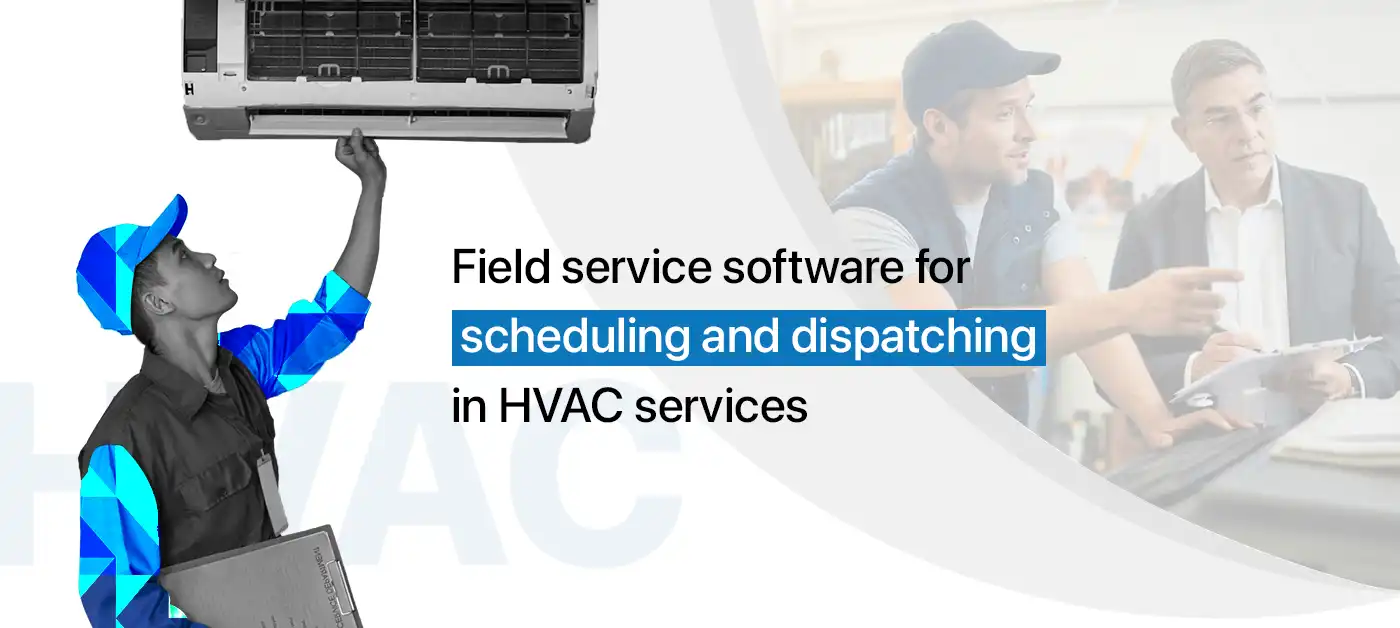5 Common Misconceptions About Field Service Software and Why It’s a Game-Changer for Your Business
Field service management software with cloud storage access has been available for quite some time, although it may not appear that way at first. An example of this is Field Squared, which was established in 2014 to disrupt the market and create a superior solution. However, that is a separate story that you can read here.
I have been contemplating writing about this particular topic for some time, and I finally found the opportunity to sit down and compile all the information. Similar to other software markets, the field service management software space has become overcrowded with specialized solutions that cater to specific industries, such as oil & gas, utilities, or telecom, or focus on specific functionalities, like mobile forms. Moreover, in the field service industry, there is often a need for enterprise asset management and other mobile workforce management software to be integrated within a unified framework, which can be challenging to find.
Due to the influx of vendors in this space, it can be challenging to sift through the noise. The prevalence of misinformation and a “look-alike syndrome” has led to various misconceptions about adopting field service software.
Our research indicates that these misconceptions often stem from patterns we have identified among our customers. Frequently, past experiences serve as a primary factor in perceiving the adoption of a solution as difficult.
What we have discovered is that field service businesses often conduct inadequate research before selecting a vendor and attempting to implement their software.
To debunk these myths and restore your confidence in the significant benefits offered by this category of technology, I will now break down the top five misconceptions about adopting field service management software.
Myth 1:Implementing Field Service Management Software is a Time-Consuming Process
One prevalent misconception regarding the adoption of field service software revolves around the perceived time commitment needed for implementation. Based on previous negative experiences with other vendors or the initial evaluation process, many companies expect that it will take six months or more to become operational.
In reality, the average field service business that adopts and implements field service software typically takes around 30 to 90 days. This timeframe encompasses training the trainers and enabling the field workforce to effectively complete work orders.
Moreover, it’s important to note that field service management software should not require a dedicated team for management, nor should it have a steep learning curve for training purposes.
We understand that software solutions should be tailored to specific needs, as one size does not fit all. However, the only exception to the average timeframe pertains to large enterprise field service businesses with thousands of field service workers or highly specialized job requirements. Due to the scale and complexity of their operations, these larger implementations may take longer to become fully operational.
To address such extensive implementations, we recommend a phased roll-out strategy. For instance, the software can be initially deployed to field workers performing similar types of work. Another approach would be a team-based or territory-based roll-out.
Myth 2: Building In-House Field Service Management Software is More Cost-Effective
With the advent of information technology and the growing presence of software procurement teams, organizations of all sizes have been prompted to consider the “buy vs build software” question. We agree that this question should be asked, but it must be evaluated within the context of clearly defined business requirements that the software needs to fulfill. Just as you wouldn’t enter a vendor evaluation without clear expectations and needs analysis, the same applies to in-house software development.
It’s essential to take into account the complexity of your field service operations as well. Often, the robust security infrastructure necessary for enterprise-grade software is overlooked when embarking on an in-house development project. However, in today’s landscape, it is imperative.
Key Factors To Keep In Mind-Building In-House Field Service Management Software
Budget
What is your budget? If you opt for an in-house development team, be prepared to allocate double the initial amount. Similar to a home remodeling project where you order 20% more materials than you anticipate needing, software development costs tend to exceed initial expectations.
Updates
Software updates come in two forms. First, embracing evolving technology requires the ability to incorporate future enhancements within the software architecture. Failure to design the software with flexibility and scalability from the beginning can result in costly limitations.
Field service technology is constantly evolving, with advancements like augmented reality, virtual reality, and the Internet of Things, and accommodating these innovations is crucial. The second aspect of updates concerns the compatibility of the underlying operating system with the software. Ongoing testing, troubleshooting, and updates are necessary, which can be an arduous and continuous cycle.
Integration and Automation
If you plan to integrate third-party tools and systems into your in-house software solution, it adds complexity. Automating updates and responses to events in the field may require changes to APIs or other aspects of integration. This further complicates the maintenance of an in-house solution and is one of the reasons why building field service software in-house is discouraged.
Talent
Even if you only require a limited set of features for your in-house field service management software, the question arises: Who will develop it? Hiring skilled software developers comes with high salary expectations, and talent competition is fierce. Additionally, developers seek projects that pique their interest. What makes your software project compelling enough to attract top talent?
Most customers we’ve spoken to who consider building field service software in-house soon realize that it is simply too costly to undertake. Ultimately, we have found that the misconception that building your field service software in-house is less expensive serves as a compelling reason to adopt an existing solution. Furthermore, some existing solutions do not require expensive customizations and can cater to various industries. Field Squared, for example, was purpose-built as a highly configurable, enterprise-grade platform from the ground up.
Myth 3: Field Service Software Doesn’t Work Offline
Technology continues to advance, offering boundless possibilities. It is both impressive and humbling to realize that many field service businesses still rely on paper-based processes, such as paper forms, manual scheduling with spreadsheets, or printed maps for navigation and asset locations.
While software plays a crucial role in enabling digital transformation, the device itself is equally important. A common objection raised is that field service workers cannot perform their tasks without a WiFi or cellular connection. It is true that not all mobile field force software support offline or disconnected mode, but there are a few that do.
Take, for example, the Field Squared Mobile App, which is a native iOS and Android application specifically designed to utilize the device’s hardware capabilities. This allows field workers to carry out their tasks even when there is no WiFi or cellular connection available. Additionally, Field Squared’s proprietary Mobile Offline Sync and Merge Engine ensures that all data and location information are automatically synchronized once a connection is restored, eliminating the risk of losing critical field information.
When evaluating field service software options, the ability to function in offline or disconnected mode should be included as a crucial buying criterion. Without this capability, the software may not effectively meet your needs, and you might as well stick with traditional paper-based processes.
Myth 4: A Comprehensive Solution for Service, Asset, and Mobile Worker Management Doesn’t Exist
As mentioned earlier, the field service management software landscape is filled with single-use case solutions that cater to specific industries (such as oil & gas, utilities, or telecom) or focus on limited functionalities like mobile forms.
However, many of our conversations with customers reveal a strong desire for much more comprehensive field service software. They seek a solution that allows them to efficiently manage service operations, assets (whether owned by the organization or the customer), and their mobile workforce—all within a single software platform.
Considering the diverse range of third-party tools and systems employed by typical field service businesses (such as ERP, GIS, CRM, and OMS), there is an additional requirement to seamlessly connect and automate the coordination of updates across these systems in response to field-level changes.
Although not widely prevalent, this type of all-in-one field service software does exist, and you can find it in solutions like our very own, Field Squared. Instead of settling for something that may fall short of meeting your requirements, it is worth delving deeper to discover a comprehensive software solution that covers all your needs in one unified platform.
Myth 5: Field Service Software is Only Limited to Scheduling and Work Order Management
It is quite common to encounter the mistaken belief that field service software is primarily designed for scheduling, routing, or basic work order management. While these functionalities are indeed common reasons for seeking a field service management solution, they merely scratch the surface. It’s time to think beyond those narrow confines.
When we engage in discussions with customers, we take a consultative approach. We delve into the underlying issues that hinder field efficiency, explore the key challenges faced by both operations management and field workers on a daily or weekly basis, and gain insights into the integration requirements with third-party tools or systems.
We carefully examine field workflows, identifying areas where automation can take over, saving time and enhancing data accuracy. Imagine field service collaboration, mobile time cards, and inventory and parts management, all seamlessly integrated within an automation engine.
Consider a simple yet impactful example: Why should field workers waste time entering customer information manually into a digital work order form when most of the information can be auto-populated? It’s these incremental efficiency gains that accumulate into significant time savings.
The same principle applies to third-party tools and systems. Automating the orchestration of changes through integration is exponentially more efficient than making manual entries across multiple systems. For instance, some of our customers have reduced payroll processing time from three days to just 30 minutes through integration, while others have eliminated 95% of paperwork through field service automation.
Why Field Service Software Is a Game-Changer for Your Business?
Implementing field service software into your business workflow is not an uphill task. In the past, transforming your business may have seemed challenging, but with the advent of the latest technologies, it has become a matter of seconds.
For field service businesses, especially HVAC service businesses, it is advisable to abandon the idea of building custom software. While it may initially seem enticing to create something tailored to your needs, the reality is that the time and effort required to build software while managing your business operations can be overwhelming. Instead, field service software like Fieldy offers a quick and seamless setup and integration process.
Field service software empowers your field technicians by providing them with all the necessary data at their fingertips, allowing them to complete more jobs in less time. With a centralized dashboard, you have an eagle-eye view of your entire operations. Fieldy, as a field force management software, goes beyond scheduling and dispatching; it offers features such as CRM, online booking, invoicing, a mobile app with offline accessibility, and a seamless online payment process.
That’s where Fieldy comes in. It is an all-in-one, affordable field service software designed to improve your operational efficiency by automating manual tasks and streamlining processes.
Conclusion
Before deciding to purchase or build field service management software, there are numerous factors to consider. Each field service business will approach the evaluation process differently, but some misconceptions about field service software adoption will likely arise. Thankfully, with this valuable guide at your disposal, you are already one step ahead, equipped to dispel the myths and make informed choices.
One Platform for all your Field Management Needs!
Sign up for a FREE trial. No credit card required.
Can't find what you are looking for?
Post your query now, and we will get in touch with you soon!




 10min read
10min read 4 Jul 23
4 Jul 23













